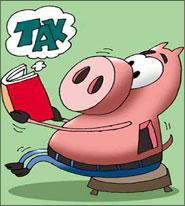 | « Back to article | Print this article |
 The government will lose over Rs 53,000 crore (Rs 530 billion) in tax revenue on account of the increase in exemption limits and tweaking of slabs in the Direct Taxes Code Bill, which will come into effect from April 1, 2012, a year behind the previous deadline.
The government will lose over Rs 53,000 crore (Rs 530 billion) in tax revenue on account of the increase in exemption limits and tweaking of slabs in the Direct Taxes Code Bill, which will come into effect from April 1, 2012, a year behind the previous deadline.
"Totally we would lose, because of the provisions of rates of taxes proposed in the DTC Bill, around Rs 53,172 crore (Rs 531.72 billion) in tax revenues. Therefore, the collection level will stand at Rs 5.27 lakh crore (Rs 5.27 trillion) in 2012-13," revenue secretary Sunil Mitra told reporters in New Delhi.
The DTC, which will replace the archaic Income Tax Act, 1961, was proposed to come into effect from April 1, 2011, but had to be pushed back by a year to allow a smooth switchover and understanding of the new regime.
"The issue that the (DTC) operation has been put on hold for a year . . . to allow all three categories (tax practitioner, tax payer, tax administrator) enough time to become adequately familiar with the new provisions in the DTC," Mitra said.
He said delayed implementation of DTC would give corporates and individuals enough time to set themselves on the right foot for the switchover from the Income Tax Act, 1961.
The government on Monday tabled the DTC Bill in the Lok Sabha. The Bill seeks to increase tax exemption on income from Rs 1.6 lakh (Rs 160,000) to Rs 2 lakh (Rs 200,000) and fix corporate tax at a flat rate of 30 per cent.
The DTC also proposes to do away with the cess and surcharge and widen the ambit of tax payers, while increasing the exemption limit.
As per the Bill, income of Rs 2-5 lakh (Rs 200,000-500,000) will be taxed at 10 per cent; Rs 5-10 lakh (Rs 500,000-1 million) at 20 per cent and above Rs 10 lakh at 30 per cent. The changes, when they take effect, will help save up to Rs 41,040 for people earning more than Rs 10 lakh a year vis-a-vis the current tax rates under the IT Act.
"Raising of the exemption limit and widening of the slab on personal for income tax will cause us a loss of Rs 14,343 crore (Rs 143.43 billion)," Mitra said.
The corporate tax, which has been proposed to be reduced to 30 per cent from 33.2 per cent, would cause a revenue loss of Rs 38,829 crore (Rs 388.29 billion).
Finance Minister Pranab Mukherjee tabled the Bill in the Lok Sabha and it has been referred to the Select Committee of Parliament for scrutiny.
Similarly, the exemption limit for senior citizens, is sought to be raised marginally to Rs 2.5 lakh from Rs 240,000 now.
Currently, income from Rs 1.6-5 lakh (Rs 160,000-500,000) attracts 10 per cent tax; from Rs 5-8 lakh (Rs 500,000-800,000), 20 per cent and beyond Rs 8 lakh, 30 per cent.
The legislation also proposes to increase MAT from 18 per cent to 20 per cent of the book profit of a company. It also seeks to levy dividend distribution tax at 15 per cent.